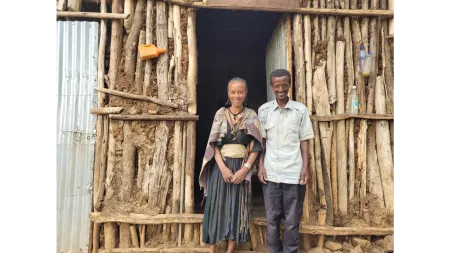Community members in Ethiopia are coming together to challenge existing social norms and traditions through discussions of topics such as early marriages, female genital mutilation, but also division of labor such as domestic tasks. Sarah Easter, Emergency Communication Officer, asked a married couple about how household chores are divided in their home.
“I was afraid that the neighbors might laugh,”expressed Wubare worriedly.
Sarah: Who generally does what in your household?
Wubare (wife): I used to spend 16 hours a day finishing all my household chores. I do the cooking, collect the firewood, and go to fetch water from a water source that is nearly two hours away. I take care of our five children, the baby I carry with me tied safely in a piece of cloth on my back. I tend to our fields and harvest the crop. Also, I clean the house, do the washing, take care of our livestock, feeding, milking, and collecting the eggs. I walk to the market to sell our crops, or the animal products and I buy the food for my family. I cook the coffee, sort and clean beans and seeds, wash the dishes, and make sure that the house is clean. I used to do this alone, just like every other wife in our community.
Wagnew (husband): Yes, I never did anything at home or helped her. It felt like a big insult if I were the one who had to do the dishes or cook. Now I actually like cooking. I make the coffee and help raise the children. Taking care of the baby is my favorite task now. Today I made breakfast for my wife and children. We do not have fixed tasks, but just communicate with each other and help each other out.

Sarah: What changed for you?
Wagnew: I joined one of CARE’s Social Analysis and Action groups. Together with other community members we talked about our traditions and norms. In one session we talked about division of labor and how we traditionally thought that domestic activities are for women only. We talked about why we thought this, and the women told us how it affects them. They spend a lot of time of their days with these tasks. If we divide the workload, then women have more free time to help the family economically and have more time to take care of the children and support them. So, we decided to change the norm and men take on a new role now.

Sarah: What did you think about when your husband came home and told you he wanted to take on a domestic role?
Wagnew (laughs): She refused my suggestion at first.
Wubare: I was afraid that the neighbors might laugh if Wagnew starts cooking and sweeping the floor and that they believe that I was a bad wife to him.
Wagnew: But I convinced her, and she understood the benefits. Also, no one ever laughed. We are changing as a community.
Wubare: I am very thankful, and I am very relieved. He takes on a lot of my previous workload that took a lot of my time. Now I feel a lot of relief and have time for myself as well.

Sarah: How does this affect your community?
Wubare: Women now have more spare time and can support their family by for example starting a small business. It changes attitudes and traditional roles. Cooking or taking care of children is no longer just female, but a task that we as a family do together. The boys in our community are growing up seeing that they also can do this work and it changes generations.
